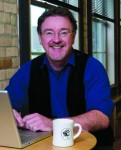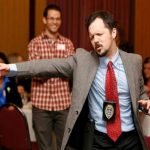Growing the next generation of green leaders

Amelia Shenstone
“Nothing could be more important than training the next generation of environmental leaders—they are the future of the future. And no one has done it more consistently than Green Corps.” –Bill McKibben, author of The End of Nature
If you aren’t familiar with Green Corps, you’re probably not alone. That’s because Green Corps Fellows typically work under the banner of other environmentally-focused organizations. But what Green Corps lacks in name recognition it makes up for in impact. Green Corps’ mission is to cultivate the next generation of environmental leaders who, “possess the skills, temperament, and commitment to fight and win tomorrow’s environmental battles,” and to accomplish this by providing classroom training and real-world field experience that places them in the middle of active environmental campaigns.
The organization is relatively young. The idea for its creation arose in 1990 with a group of college graduates looking to apply their environmental ardor but finding few opportunities for those lacking activist experience. Their efforts led to formation of the group in 1992 by the U.S. PIRG, a federation of state public interest research groups that, “stands up to powerful special interests on behalf of the American public, working to win concrete results for our health and our well-being.”
The resulting Green Corps program provides an intense, one-year experience for recent college graduates that includes eight weeks of classroom training on the tools of environmental activism, rotating field assignments, and placement after graduation. Funding for the program, including Fellow stipends, comes from private donations, foundations, and the organizations with which Green Corps partners. In Wisconsin, those partners have included Wisconsin Environment and the Wisconsin League of Conservation Voters Institute.
Amelia Shenstone, an exuberant young woman of 23, is a Green Corps Fellow on rotation at Wisconsin Environment, an organization dedicated to protecting Wisconsin’s air, water, and open spaces. Wisconsin is her fifth and final placement; she previously assisted with environmental campaigns in Indiana, Texas, Florida, and Missouri.
Shenstone says she saw the power of activism while serving as a canvasser in New Orleans for the “Defend Our Wetlands, Defend Ourselves” campaign after graduating from Mount Holyoke College in Massachusetts. “I was so inspired [in New Orleans],” says Shenstone, “People were standing up and organizing themselves in the face of great injustice. But I didn’t really understand how they were organizing their campaigns. When I took the canvasser job I saw there were skills to be learned and I wanted to learn them.” When Shenstone found out about Green Corps through Craig’s List, and then connected with a friend of a friend in the program, she knew this was the opportunity for her.
Noelle Janka, Green Corps Recruitment Director, says that more and more, passionate young people like Shenstone are discovering Green Corps. While the organization has traditionally received 1500 applications for 30 annual slots, last year they received more than 2300, bolstered by the recent presidential election. “A lot more young people believe in making change via the political process now,” says Janka. “Many worked on last year’s election, or their friends or family members worked on it and they’ve got the bug now that they’ve seen it work.”
Those selected for the Green Corps program begin their training in Boston. They learn about current environmental problems, the U.S. political and socio-economic system, volunteer recruitment, grant writing, leadership development, grassroots fundraising, staff management, media relations and more. Following training, participants are placed in field assignments to get live, hands-on experience with partner organizations. Some of those placements focus on gaining local support for national environmental issues. Others involve a very specific regional, or even local, focus. “We usually have at least one campaign in Wisconsin every two years,” says Janka. Recent campaigns here at home have centered on clean water, supporting environmentally-friendly candidates, and renewable energy.
In 2005 and 2006, Green Corps Fellows worked on behalf of the environmental group Oceana to educate the community about mercury pollution and seafood contamination from the Port Edwards chlorine plant near Wisconsin Rapids. The effort generated hundreds of signed postcards and e-mails, in addition to phone calls and front-page stories in the local paper. These actions encouraged the plant to explore and later commit to employing mercury-free technology.
In 2008, Green Corps drove outreach activities on Wisconsin college campuses to educate students on climate change and the Power Vote pledge. The pledge states that young voters expect presidential candidates to focus on issues of climate change. The initiative trained student volunteer leaders at UW-Madison, UW-Milwaukee, Marquette University, UW-Whitewater, UW-Green Bay, UW-Parkside, Lawrence and Ripon, Madison Area Technical College and Milwaukee Area Technical College.
Also in 2008, working with 1Sky, an organization devoted to stemming global warming, a Green Corps organizer in Madison mobilized 17 organizations including the Urban League, Physicians for Social Responsibility, and MUCHA, a Latino community group, to bring legislative focus to the issue of renewable energy. Citizen activists and leaders were recruited and trained, and educational forums on global warming and the need for clean energy were held.
Jessica Garrels, now Organizing Director for the Wisconsin League of Conservation Voters Institute (WLCVI), supervised seven Fellows in 2006 and describes them as “smart and quick, flexible, passionate, analytical and reflective.” Under her supervision, the Green Corps Fellows focused on three issues: passing the Great Lakes Compact, which protects the Great Lakes from water diversions and addresses water management; keeping waterways manure-free; and keeping out-of-state waste out of Wisconsin. Through their efforts, thousands of public comments to local elected officials were generated, dozens of face-to-face meetings between constituents and local leaders were held, press conferences were hosted, op-eds were penned, and over 200 local citizens were trained to be advocates who would engage local of-ficials in dialogue and continue to advance pro-conservation policies.
“Since we’re a non-profit organization, it’s very rare that we would have the ability to have people placed in seven regions around the state, so their presence did a lot to raise our profile,” says Garrels. “What they did in 2006 set the stage and laid the groundwork for victories the WLCVI was able to achieve in the 2007-2008 [legislative] session. There was some great movement to reduce out-of-state waste in the 2007 budget, and in 2008 the Great Lakes Compact was signed into law, which was not at all inevitable when the 2007 session started.”
In her duties with Wisconsin Environment, Shenstone is currently focused on building grassroots support to advance clean energy for Wisconsin and help move the Wisconsin legislature toward a law requiring the state to use 25% renewable energy by 2025. Shenstone’s experience in Milwaukee has been very favorable. “The people in Milwaukee I’ve talked to are very supportive of renewable energy. They just don’t know how much potential we have,” says Shenstone. “It is absolutely possible to meet the equivalent of our energy consumption by using renewable energy. We don’t have fossil fuel resources so we are exporting $16 billion to other states and countries. And that is money we could be investing right here.” Later this summer, she will shift her efforts to focus on advancing inter-city, high-speed rail.
Shenstone is very excited about her future and says Green Corps has prepared her well to assume other environmentally-focused posts. Following graduation, Shenstone relays that she’ll probably head south where she sees the needs, the barriers, and the opportunities as great. “The environment brings so many issues together. We all say, ‘I like trees. I like parks.’ But I think we do ourselves a disservice by talking about the environment as if it were just that park. We all need a healthy and safe place to work and play. We want to make our world a livable place and we need to take a look at who is getting the short end of the stick and find ways to address that.”
With Shenstone and other Green Corps alumni leading the charge, the promise of a green and renewable tomorrow burns bright.
For more information on:
Green Corps, visit www.greencorps.org . The application process for next year will open in the fall of 2009.
How to support renewable energy, clean water, and open spaces in Wisconsin, visit www.Wisconsinenvironment.org, or www.conservationvoters.org.
-Janet Arnold Grych





















